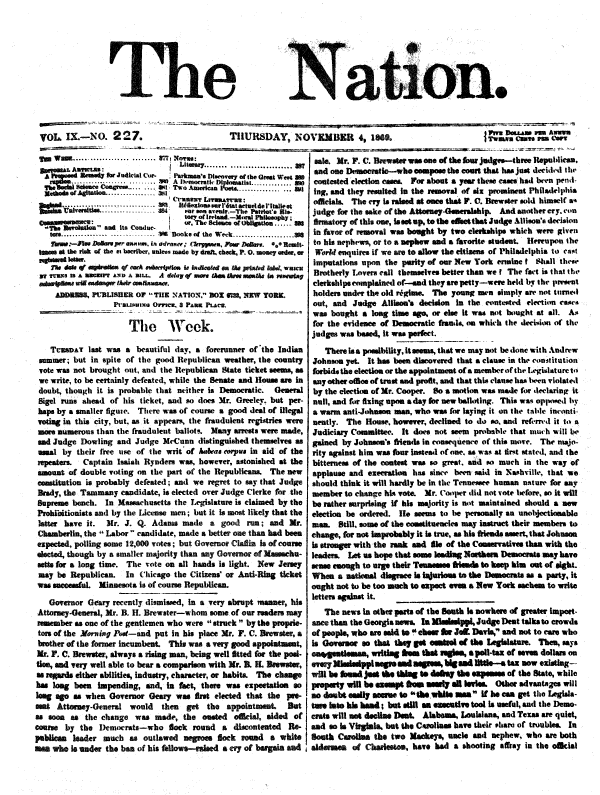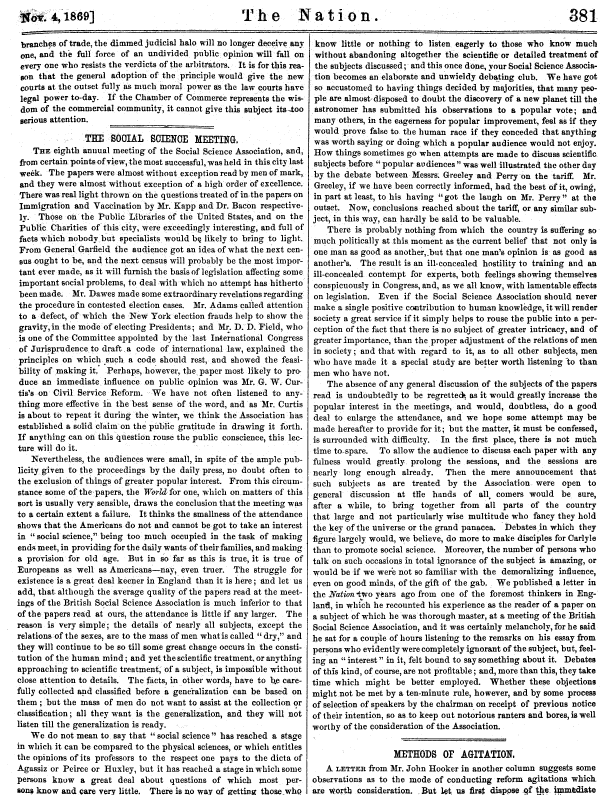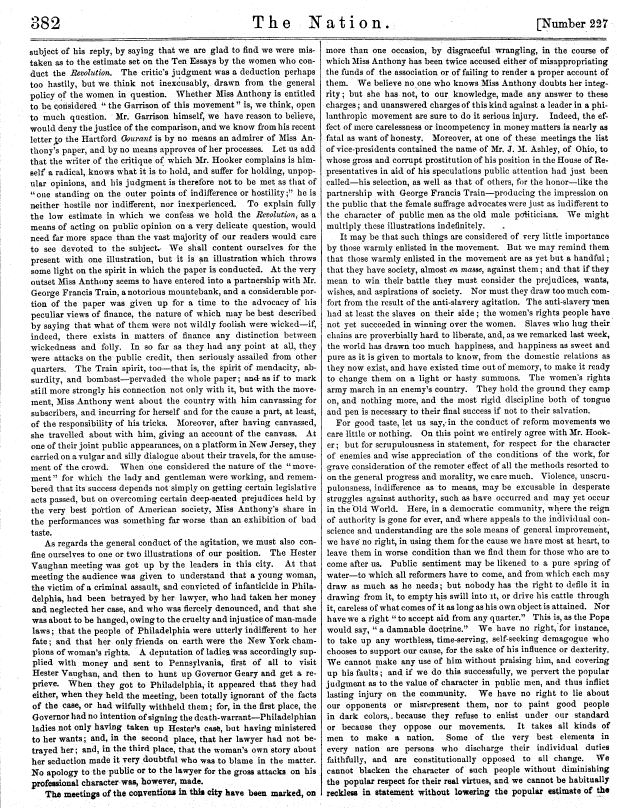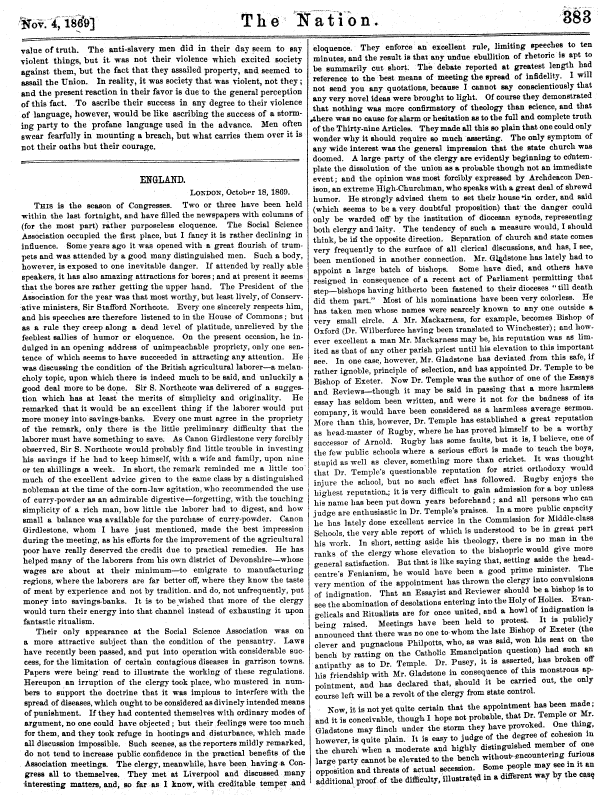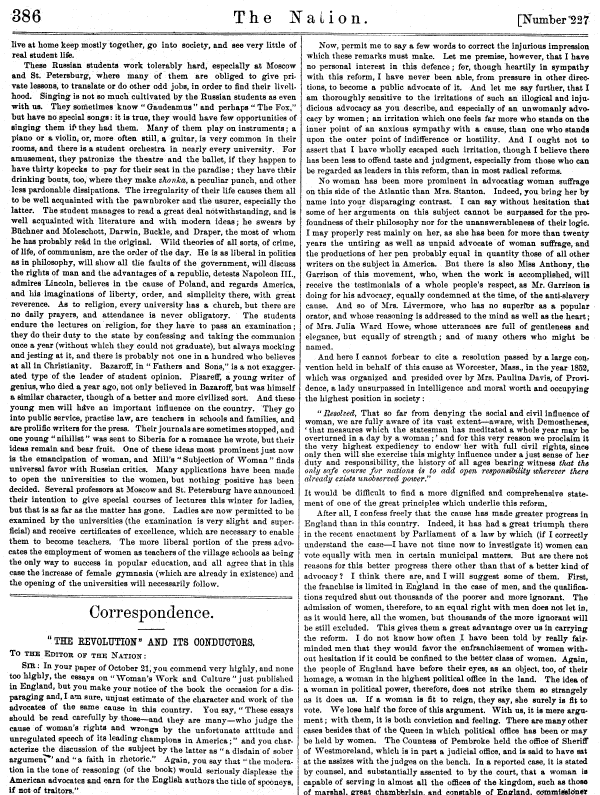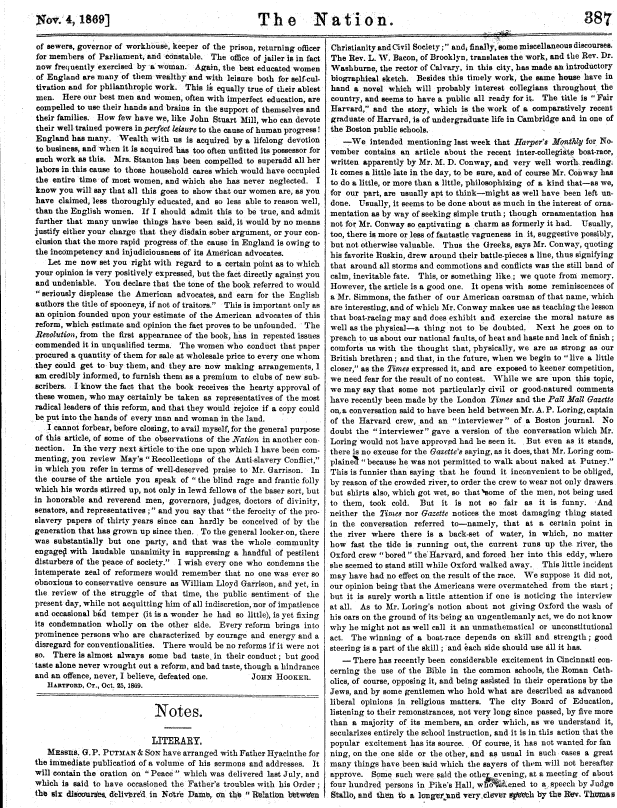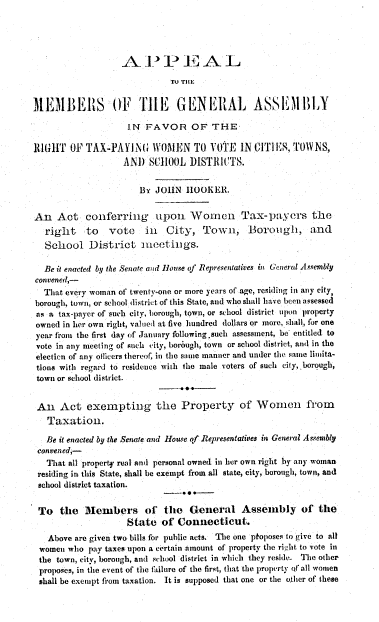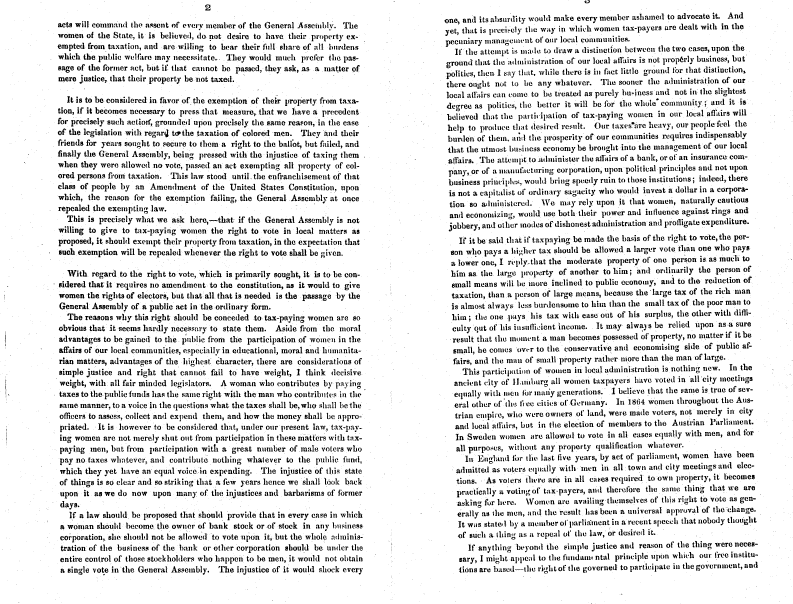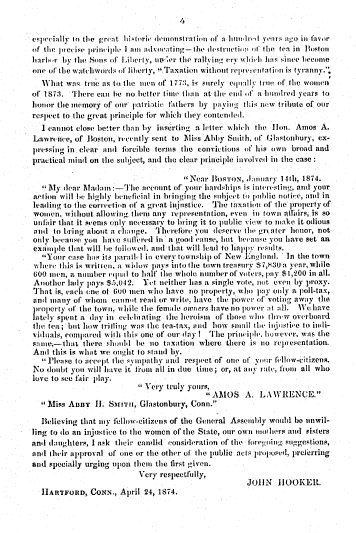John Hooker [Note: Much of the following narrative is in quotation marks because it is taken from a book written by John Hooker entitled Some Reminiscences of a Long Life, with a Few Articles on Moral and Social Subjects of Present Interest, published in 1899.] |
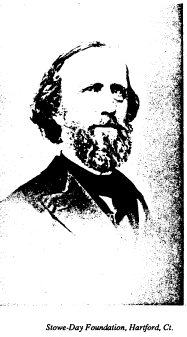
|
"I was born in the town of Farmington, Connecticut, April 19th, 1816. My father was Edward Hooker, who was the fifth in direct descent from Thomas Hooker, the first minister of the First (now Center) Church of Hartford, and whose son Samuel was the second minister of the church in Farmington, whose pastorate of thirty-six years closed with his death in 1697. My mother was Eliza Daggett of New Haven, who was first cousin of the mother of Roger S. Baldwin, Governor of Connecticut, of William M. Evarts, and of Senator and Judge Hoar of Massachusetts, all of whom thus became my second cousins. My father graduated at Yale College in 1805, and was afterwards a tutor there, and in the South Carolina College at Columbia, South Carolina, finally settling in Farmington, where for a few years he kept a private classical school, and later retired from all active employment, except that of cultivating an extensive farm which he had inherited. He died in 1845, at the age of 61.
"I was married on the 5th of August, 1841, to Isabella, the youngest daughter of Rev. Dr. Lyman Beecher.... We have had four children," Edward Beecher, Alice, now the wife of John C. Day, Thomas, who died soon after birth, and Mary, now Mrs. Henry E. Burton.
"I attended the district school of my native town until I was about ten, when I entered the Farmington Academy, kept by Simeon Hart, a noted teacher of the time, where I fitted for college, entering Yale college when I was sixteen. My preparation for college was greatly aided by the private instruction of my father, who was a rare classical scholar for that day, and who began to drill me in Latin and Greek at quite an early age. My college course, however, was never completed. I was taken ill before the close of my second year, and had a long course of typhoid fever, upon my recovery from which I began too early the attempt, by hard study, to overtake my class, the result being an injury to my eyes that compelled me to discontinue my studies, and has afflicted me all my life. The college, later granted me a degree....
"In my uncertainty what to do, and in the probability that I should have to follow an active outdoor life, and in the hope, too, of benefiting my general health, I went on two voyages, one to the Mediterranean and one to China, both before the mast. On our return voyage from China, when in the mid-Atlantic, near the latitude of the lower West India Islands, our vessel was overhauled and taken possession of by a Portuguese pirate....
"After my two years of sea life I took up the study of law, and was admitted to the Hartford County Bar in 1841. I opened an office in Farmington, was married later in the same year, and resided there until the fall of 1851, when I removed to Hartford, where I have lived ever since....
"In 1853 I purchased, with Hon. Francis Gillette, who had married my sister, a farm of a little over one hundred acres, lying just outside of the limits of the city of Hartford, on the Farmington road. It had belonged to William H. Imlay, who had held it for thirty years or more, and was called 'Nook Farm,' this name having been given to it because the river, now called Park river, curved about the southern part of it in such a way as to leave some thirty or forty acres within the nook. At that time there was a comfortable farm house quite a distance in the interior, but no other dwelling house. The city limits were extended a few years later and the whole farm taken into the city. It has now five city streets, well filled with city houses, the southern part containing several factories.
"I built a house for myself on a street which we opened and called Forest street, Mr. Gillette occupying for three or four years the farm house and later building a large and very pleasant house on the same street. The neighborhood where we lived still kept the old name of 'Nook Farm,' and that name remained a familiar one for many years, and has hardly yet disappeared. The early comers were generally family or personal friends and we lived like a little society by ourselves - each of us making free of the others' houses, and each keeping open house, and all of us frequently gathering for a social evening or to welcome some friendly visitor, often some person distinguished in political, literary or philanthropic life, who had come to some of our houses." In these conversations I was referred to as "the Puritan Wag," no doubt owing to my ancestry to some extent, although there can also be no doubt as to my intense religious convictions. I saw myself as a "Bushnell congregationalist," though. I rejected the impersonal and cold preachings of many of the congregational clergy for the more uplifting and spiritual approach of our friend the Rev. Dr. Horace Bushnell. We all were fairly liberal in that respect - and ardent abolitionists, many of us, too.
"There was a curious thread of relationship running through our little neighborhood. As I have already stated, Mr. Gillette and I were the first settlers, and Mrs. Gillette was my sister. Soon after came Thomas C. Perkins, an eminent lawyer of the city, whose wife was sister of my wife. Then came Mrs. Stowe, another sister, who at first built a house on another part of the farm, but subsequently came to live close by us on Forest street. My widowed mother early built herself a cottage next my own house. Elizabeth, daughter of my sister, Mrs. Gillette, married George H. Warner, and she and her husband settled close by us. Next came Charles Dudley Warner and his brilliant wife, he being the brother of George H. Warner just mentioned. Joseph R. Hawley, then my law partner, but since a general in the war and senator in Congress, met at my house, and afterwards married, Harriet W. Foote, a cousin of my wife. They also settled in our immediate neighborhood. Rev. Dr. Nathaniel J. Burton and his wife were for two years members of my family, becoming family connections by the marriage of my daughter to Dr. Burton's brother." Dr. Burton was also a liberal congregationalist like myself. Even the eminent Mark Twain, whose wife is the daughter of our friends the Langdons of Elmira, New York, has visited here and is considering moving to Hartford permanently.
"In January, 1858, I was appointed by the judges of our Supreme Court the reporter of the court,..." which office I continue to hold and exercise along with my regular legal practice. This practice provides the income we so desperately need in order to support our many activities in support of the emancipation of women (now that the slaves have been emancipated).
I have long supported the woman's rights movement in this country, through my writings and more recently through efforts to achieve various legislative enactments. My wife also has long been interested in the woman question and has gone well beyond any of the members of her family in advocating specific legal reforms. Ever since we read Blackstone together in the early days of my law practice and puzzled over the traditional bondage under which women suffer, we have been eager for change in our country's laws and customs.
There are some among our friends, including my wife's own sister Catharine, who feel our pursuit of the suffrage to be inappropriate, and, in fact, demeaning for women. Since Isabella organized the Connecticut Woman Suffrage Association in Hartford in 1869, we have had to endure great criticism from family and friends alike, as well as from all quarters of the country (I wrote the resolutions which were adopted at the convention, and was chosen Treasurer of the organization). Even some of those within the suffrage movement itself do not approve of our continued association with Susan B. Anthony and Elizabeth Cady Stanton of New York. Nevertheless, I believe no struggle for justice and the uplifting of a formerly downtrodden segment of society has been without its controversy and its vast array of enemies. I continue to encourage Isabella to work for her ideals, although her increasing energy dwarfs my meager words of support. I have never so admired her, all our married life, for her courage and determination in the face of adversity, as I do now - and heaven knows I have marveled a good deal at her stoic dedication over the years to the upbringing of our family and the maintenance of our household.
I, myself, am spending more and more of my time on the suffrage question, and becoming more and more convinced that there is no greater question before the American people as the status of one half their population. I look forward to seeing reform on this question in the near future, as the movement spreads rapidly across the country and into the nation's capital.
